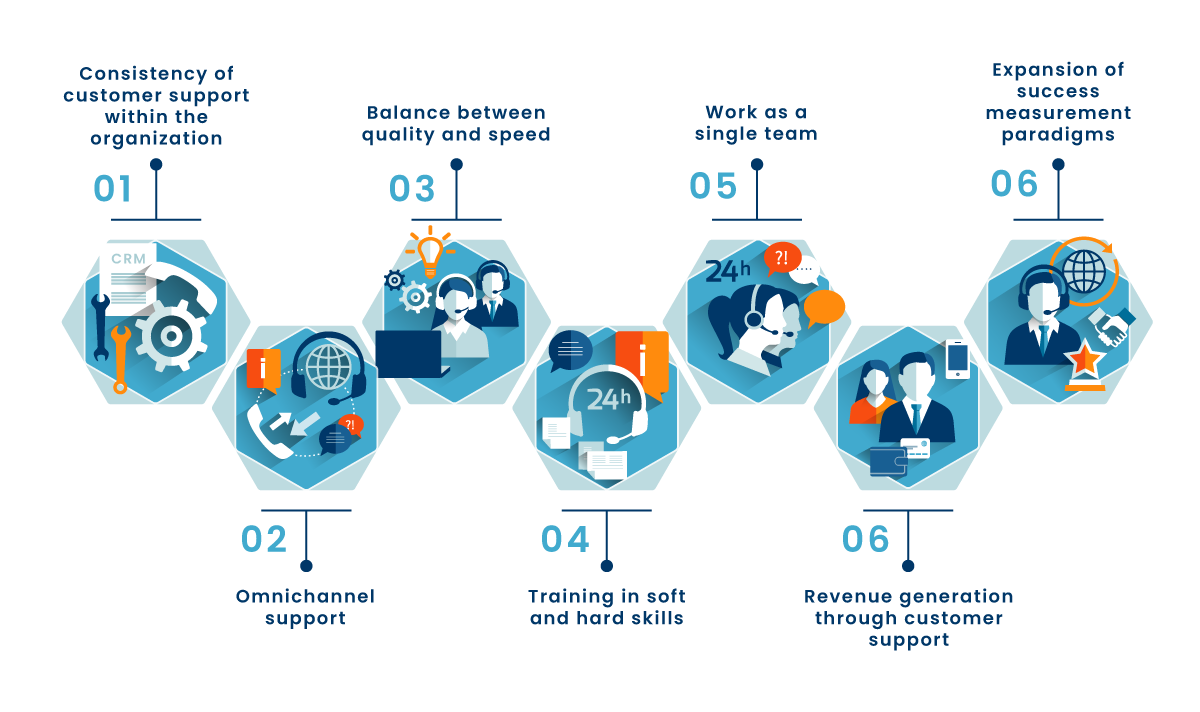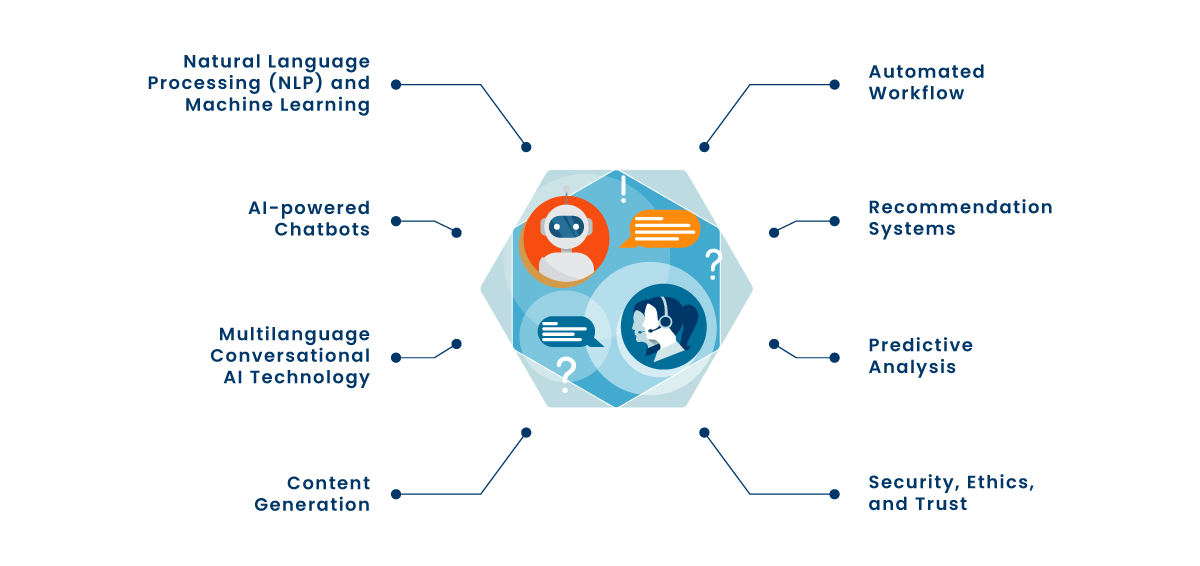One extraordinary achievement of Salesforce is its improvement of customer support through the integration of AI, machine learning, and natural language processing (NLP). This combination, with conversational AI and sentiment analysis, redefines the customer service experience.
The benefits of artificial intelligence are clear. For instance, it provides various tools that simplify the real-time resolution of cases and customer inquiries, such as chatbots. It also facilitates systems that optimize customer service teams, contact centers, and knowledge bases. In other words, the integration of AI in customer service enhances interaction, operational efficiency, and the overall user experience.
Customer service: an evolving concept
While a few years ago customer support was exclusively associated with post-sales support, it now goes beyond solving specific problems. Organizations are now focusing on a customer-centric approach that emphasizes redefining customer interactions before, during, and after purchases. This has made customer support a strategic function for organizations.
In fact, customer support is now referred to as the new marketing because customers are looking for more than just quality products, they also seek positive experiences and personalized treatment. Therefore, customer support must be proactive, immediate, and effective to ensure building strong relationships, retention, and loyalty.
Not only does providing excellent service from all areas promote customer satisfaction it also meets current needs, which leads to positive feedback, recommendations, and loyalty. This significantly contributes to marketing and the construction of a positive brand image. Thus, support agents take on the role of customer advocates and brand ambassadors in an increasingly competitive market.
Salesforce’s Customer Support Pillars
Salesforce recommends 7 pillars to ensure excellence in customer support. These are:

1- Consistency of customer support within the organization: Ensuring consistent interactions between departments is fundamental. Customers expect a consistent experience at all times, whether before, during, or after purchase. The areas of marketing, sales, finance, and support must be aligned with each other. The best way to ensure this is to have all departments into the CRM, thus facilitating a unified view of each customer.
2- Omnichannel support: Offering excellent customer support involves being present on various channels, ensuring quick and high-quality responses.
3- Balance between quality and speed: Automation and omnichannel routing are key to balancing both speed and quality in customer support. This allows agents from involved areas to focus on cases according to their skills and availability.
4- Training in soft and hard skills: Agents must develop both hard and soft skills to offer comprehensive support. Ongoing training is essential to support them in their more complex job functions.
5- Work as a single team: Despite working individually with customers, agents need a sense of support and collaboration, which is even more crucial for remote teams. Keeping lines of communication open and using collaborative approaches is vital.
6- Revenue generation through customer support: After solving a problem, customer support can become a revenue generator through additional cross-selling and upselling.
7- Expansion of success measurement paradigms: In addition to management time, other metrics should be considered to obtain a more complete understanding of the customer’s relationship with the company. For example, customer satisfaction (CSAT), revenue, customer retention, customer effort, and performance of service level agreements (SLA).
AI in Salesforce
Salesforce was the pioneering CRM in incorporating AI into its processes. This incorporation constituted a qualitatively superior leap for the CRM’s functioning and, by extension, for all companies that benefit from its features. As a cloud-based customer relationship management platform, it operates as software as a service (SaaS) that expands its capabilities with the integration of AI.
The use of AI in business processes enables agents in any area to predict and plan future actions based on real-time data analysis. This makes the decision-making process more agile and efficient. With the strength of AI, Salesforce transforms its regular customer support into an intelligent experience. Additionally, this extends to all company business processes, allowing for a qualitatively superior level of service.
AI-Driven Capabilities for Customer Support
Since its launch in 2015, Einstein has been the flagship AI technology of Salesforce. It currently leads the technological revolution and is the trusted AI of the CRM. With a conversational user interface, Einstein seamlessly integrates into all applications and workflows. Thanks to its set of customizable and secure tools, it adapts to the specific needs of each user.
The past Dreamforce 2023 marked a turning point in this regard. Under the approach Data + AI + CRM + Trust, Marc Benioff assured that the new evolution of Salesforce would turn anyone into an Einstein. Although he spoke metaphorically, the reality is not far off if the full potential of the CRM is leveraged.
Thanks to this mega-event, we learned about the brand-new Einstein Platform 1, which merges Data Cloud technologies and AI innovations, transforming the user experience. It provides reliable AI technology for businesses, allowing the creation of low-code applications, and offering completely renewed CRM experiences.
Conversational AI assistant Einstein Copilot is integrated into all Salesforce applications, improving productivity by providing data-safe answers in natural language to user queries. It also takes proactive measures, such as offering recommended action plans or checking order status thus enriching the user experience. Lastly, the Einstein Copilot Studio is where you can experience all the magic. This powerful tool amplifies Einstein’s capabilities by creating efficient and reusable workflows.
The Einstein Platform 1 is the expression of the highest AI technology achieved at the moment in service of the organization. But how can AI optimize customer support? AI has a set of capabilities and tools that can be used by all areas of the company, including those directly related to the customer.

Natural Language Processing (NLP) and Machine Learning.
Natural language processing and machine learning algorithms allow the interpretation of human language. This enhances the system’s ability to interact automatically with customers and allows the analysis of positive and negative sentiments to respond appropriately at each moment. This way, a better understanding of customer questions and complaints is achieved, allowing for a personalized response to the needs of each case.
AI-powered Chatbots.
Chatbots have become one of the first solutions for customer interactions. Chatbots can provide immediate answers to general and basic customer questions. They also learn from their needs and preferences through interactions. This significantly enhances the user experience and satisfaction. Additionally, chatbots can handle large volumes of customer requests, boosting agents’ productive time and maintaining 24/7 attention.
Multilanguage Conversational AI Technology.
Conversational AI technology backed by NLP, revolutionizes multilingual support by enabling instant translations during customer interactions. This innovation not only facilitates communication in various languages but also enriches the user experience by eliminating language barriers, allowing more effective responses with real-time understanding.
Content Generation.
Content generation through artificial intelligence represents a significant advancement. By analyzing customer messages, AI has the ability to discern patterns and trends in the language used, allowing the creation of personalized and contextually relevant content. This capability goes beyond simply understanding queries or concerns. AI evaluates the tone, context, and preferences of the customer. It can craft responses more and more similar to human ones in terms of information, style, and specific scenarios. This adaptability in content generation not only improves response efficiency but also contributes to a more personalized and satisfactory user experience.
Automated Workflow.
Automating basic daily tasks reduces manual intervention, translating into lower risks of human errors and a better customer experience thanks to faster support. Likewise, agents themselves can enjoy automated service logistics that enhance their work with customers and in the company in general.
Recommendation Systems.
AI-driven recommendation systems analyze customers’ comprehensive behavior across all possible channels. This allows them to generate recommendations tailored to each customer’s preferences, enabling companies to improve opportunities for additional cross-selling and upselling.
Predictive Analysis.
The accuracy in predicting customer needs and desires is due to the analytical capacity of artificial intelligence to identify behavior patterns, needs, and possible issues. This is crucial to address their concerns and adjust responses to their demands as precisely as possible.
Security, Ethics, and Trust.
Security and trust are key factors in customer support. Many companies have gone bankrupt for not being able to protect their customers’ data and having leaks in their databases. Salesforce’s robust AI architecture, known as Einstein Trust Layer, is the foundation of the ethics and security that characterize the platform. It has high standards of data protection, PII encryption, and prevention of retention by third parties. The security detector prevents risks and ensures secure responses, complying with regulations and providing companies with visibility and control.
Benefits of AI Technology for Customer Support
Salesforce’s prioritization of customer support significantly improves with the integration of AI into the CRM. Einstein provides various tools, solutions, and capabilities that enhance the effectiveness of customer support, demonstrating its positive impact on companies.
Teams interacting with customers experience increased efficiency in managing task volumes, showing the benefits that AI brings. To be more specific, AI optimizes customer support before, during, and after the purchase in the following ways:
- Reduces response time: Process automation with chatbots or AI assistants significantly reduces response times, ensuring quick attention and improving customer satisfaction.
- Enhances accuracy: Provides agents with relevant real-time information based on a comprehensive customer view. This improves response efficiency and reliability, reducing potential errors.
- Offers personalization: AI, thoroughly understands each customer, facilitates personalized actions according to their preferences, and significantly contributes to customer satisfaction, retention, and subsequent loyalty.
- Ensures 24/7 support: It is available at all times, providing constant responses and attention, ensuring that customers feel attended to without time restrictions.
- Reduces costs: Optimizes time and allows savings in labor costs, reducing the need to hire additional staff for customer support.
- Provides valuable insights: AI analyzes large volumes of data to offer precise insights into customer behavior, preferences, and trends, allowing anticipation of future needs and requests.
- Optimizes agent time: Automation of simple responses allows agents from all areas to focus on more complex situations, ensuring continuous support for all customers and addressing special cases promptly, whether it’s a potential customer in the case of sales or a case requiring human support.
- Enhances agent efficiency and productivity: The integration of AI into customer support processes boosts the efficiency and productivity of agents, improving service quality. It also reduces fatigue and work stress for agents.
- Ensures customer satisfaction and retention: All contributions of AI directly impact customer satisfaction, promoting long-term retention and ultimately, loyalty.
AI is undoubtedly a competitive advantage for customer support. It not only provides benefits to customers, as they receive the treatment they expect and deserve, but also to the agents responsible for interacting with them. If you want to enhance customer support in your organization through the capabilities of AI technology, do not hesitate to contact the SkyPlanner team. We have the expertise to accompany you at every stage of the way. You can reach us at hello@theskyplanner.com.



